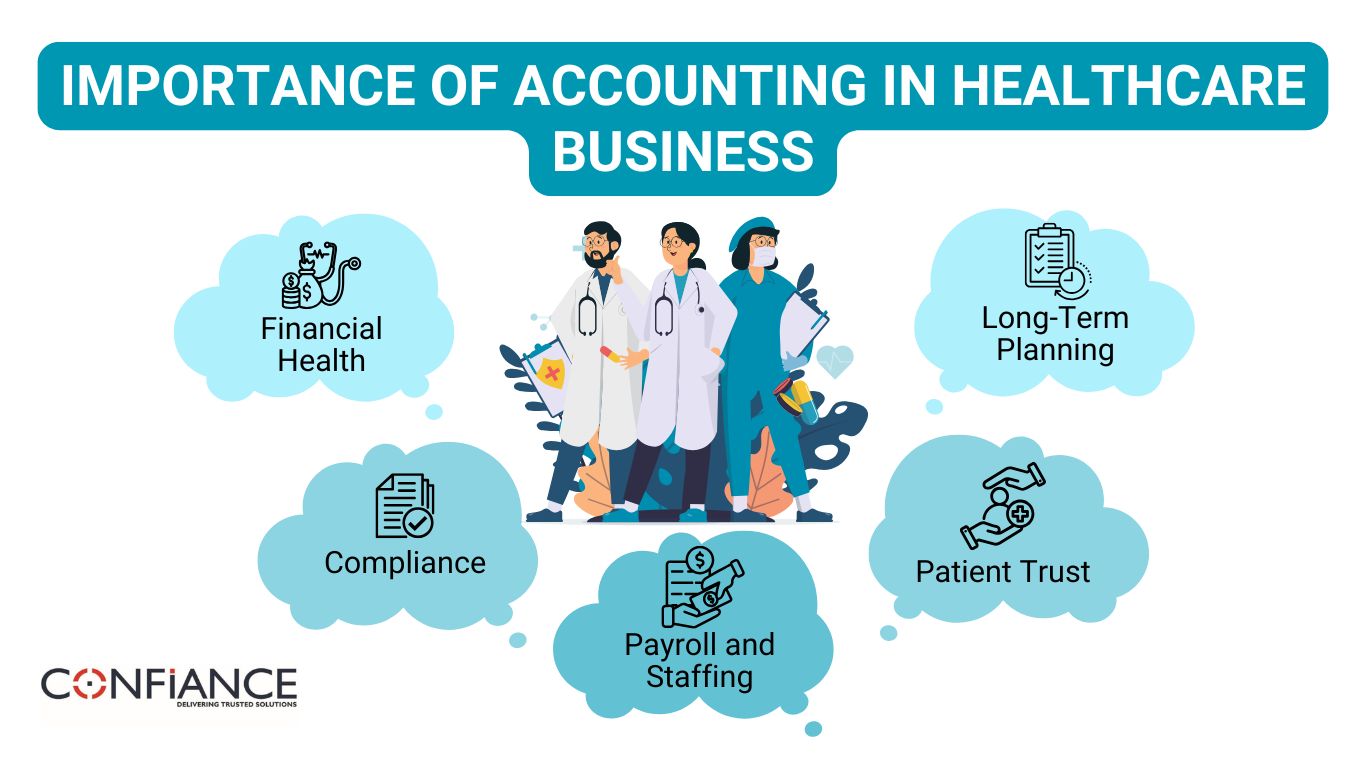
What Is Healthcare Accounting? Understanding Challenges & Importance
Healthcare accounting is how a healthcare organization tracks and manages money. It shows how cash moves in clinics, hospitals, and care centers. This includes billing, claims from insurance companies, paychecks, supply costs, and reports. Each medical office needs clean and clear records. So, healthcare accounting must follow strict rules to keep both cash and patient data safe.
Healthcare finances deal with private info, public funds, and many payers. That means the system must be both right and safe. It is not just about cash flow. It also handles aid, gifts, refunds, and law rules in health care. Now, let’s look at key problems in medical accounting.
Common Challenges in Healthcare Accounting
It is even more complex than most industries. Here are the most common problems:
1. Insurance Billing and Reimbursements
Handling health insurance payments is one of the hardest parts of managing healthcare finances. Every insurer has its own process. Claims must be coded correctly and submitted on time. A small mistake can delay payment for weeks or even months.
Medical billers also face denied claims. These need to be corrected and resubmitted, which adds to the workload. If errors stack up, providers lose money.
2. Changing Regulations
In the healthcare industry, rules change often. Laws affect billing, reporting, and tax rules. If you don’t keep up, you risk fines or losing funding. Many practices don’t have the time or staff to follow every change.
3. Complex Revenue Streams
Healthcare providers receive money from insurance, government programs, private payments, and grants. Each source has its own rules and reporting steps. Managing these details is essential to maintaining a smooth revenue cycle.
4. Lack of Integration Between Systems
Many healthcare offices use separate tools for billing, payroll, and records. When systems don’t connect, staff repeat tasks and make more errors. It also slows down reporting and makes it harder to track money or match payments.
5. Staffing Issues
Not all offices have trained accounting professionals in healthcare accounting. When staff leave, new recruitment needs time to learn the process. These gaps lead to delays, errors, and missed steps.
To fix these problems, healthcare providers need to understand why accounting is important.

Importance of Accounting in Healthcare Business
Accounting keeps healthcare businesses running. It tracks income, expenses, and payments from insurance or patients. It helps providers pay staff, manage supplies, and plan for future costs. Without clear records, it’s hard to stay open, follow laws, or give steady care. Here’s how accounting is important in the healthcare sector:
Financial Health
Good accounting gives a full picture of the clinic’s finances. Owners and managers can see which services make money and which don’t. With this insight, they can make informed decisions about future growth and avoid waste.
Compliance
Proper records help a clinic follow state and federal rules. If you get audited, you’ll need to show clear, accurate financial information. Without it, you could face large fines or legal trouble.
Payroll and Staffing
Healthcare workers expect to be paid on time. Accountants make sure payroll runs smoothly, benefits are tracked, and taxes are paid correctly. If these tasks fall behind, staff morale can drop, which can impact the quality of patient care
Patient Trust
Errors in billing can upset patients. If someone is overcharged or billed twice, it reflects poorly on your office. Clear, accurate accounting builds trust and keeps your reputation strong.
Long-Term Planning
Accounting helps with more than day-to-day tasks. It also helps clinics plan for expansion, invest in new equipment, or apply for loans. Accurate books make those choices easier and safer, helping leaders in healthcare management plan resources for growth.
In-House vs. Outsourced Healthcare Accounting
Managing books in-house works for some, but outsourcing often brings better results. Here is a clear view of both:
| Area | In-House Accounting | Outsourced Accounting |
| Cost | Salaries, benefits, and tools make this costly | Flat fees or rates are often lower overall |
| Skill Level | May lack training in healthcare rules | Specialized teams with deep knowledge |
| Time Needed | Staff must balance this with other tasks | Outside team handles it fully |
| Software Tools | Often basic or outdated | Firms use advanced, integrated tools |
| Error Risk | High if staff are new or untrained | Lower due to checks and system use |
| Flexibility | Fixed hours and schedules | Can scale up or down as needed |
Outsourcing works best when your team is stretched thin or lacks deep accounting skills.
When to Outsource Healthcare Accounting Services
There comes a time when doing all your tasks in your office stops making sense. Here are clear signs that it may be time to outsource healthcare accounting:
You Are Always Late with Billing
If your team can’t send bills on time or follow up on unpaid ones, you lose money. A service can step in, take charge of billing and collections, and boost cash flow.
You Do Not Have a Trained Accountant
Many offices rely on staff who are not trained in finance. They try but often miss key points. Outsourcing gives you skilled help without hiring someone full time.
Your Office Is Getting Bigger
More patients and staff mean more records and more work. That means more need for better books. Outsourcing lets you keep up without adding stress to your team.
You Face Audits or Fines
If you have been audited or fined, your records may be off. A firm can fix old issues and help you avoid more in the future.
Your Software Is Not Helping
If your tools are slow or dated, an outside firm can help you change or improve them. They often use tools that mix billing, payroll, and reports in one simple system.
Quick Healthcare Accounting Checklist
Use this list to check if your office is on track:
- Are claims filed and followed up on time?
- Do you track rejected claims and fix them fast?
- Is payroll done without delays or issues?
- Are staff taxes and benefits calculated right?
- Do you use tools that connect billing, payroll, and reports?
- Are reports reviewed each month?
- Can you find past invoices or payments fast?
- Do you track income from all payers clearly?
- Is your cash flow steady and planned?
- Do you meet all tax and audit rules?
If you miss more than a few, it may be time to update your system or get help from experts.
Healthcare accounting helps you manage your cash, stay on track, and meet the rules. It shows income, costs, and payments from both patients and insurance. Without it, your office may face delays, mistakes, or missed steps. Clear books help you offer good care and smooth work.
Confiance offers bookkeeping and accounting for healthcare offices. We handle your billing, staff pay, and reports so you can care for your patients. We work with clinics, practices, and care centers of all sizes. Reach out now to make your finances easier.
FAQs
1. What makes healthcare accounting different from other industries?
- It deals with private data, strict rules, and many payment sources. It also has to follow healthcare laws and meet reporting deadlines.
2. What is challenging about accounting?
- Healthcare accounting has strict rules, complex billing, and many payers. Small errors can lead to delays, fines, or lost payments.
3. What are the 4 C’s of healthcare finance?
- They are cost, cash, capital, and control. These help providers manage spending, plan ahead, and keep the business stable.
4. What are the two main types of accounting in healthcare?
- Financial accounting shows overall income and spending. Managerial accounting supports daily planning and cost control.
5. What are the 3 main financial statements used in healthcare?
- They are the income statement, cash flow statement, and balance sheet. These show earnings, costs, assets, and available cash.
6. Why is cash flow important in healthcare?
- It shows if there’s enough money to pay bills and cover daily needs. Even profitable clinics can struggle with cash flow.
